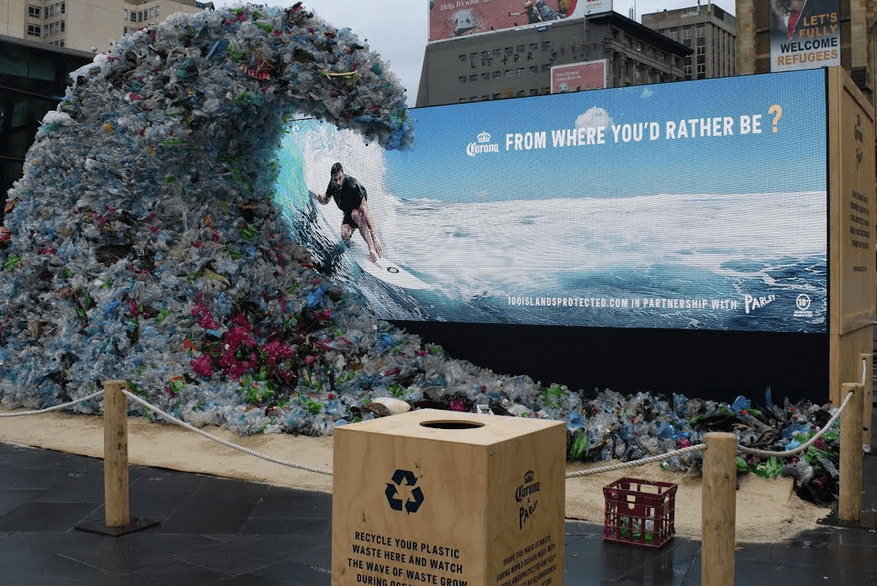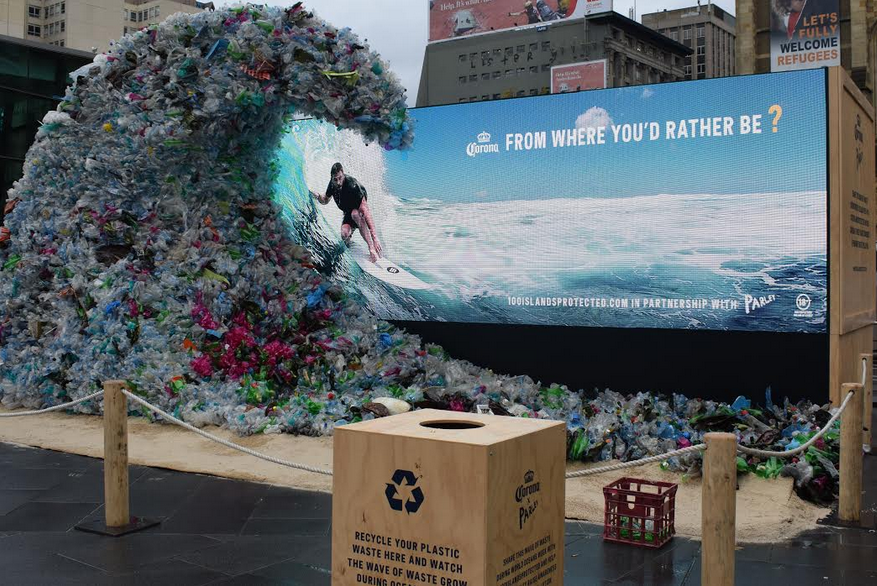Australia at the Forefront of Marine Debris

The sea is a mysterious place. Mostly undiscovered, uncharted and unknown territory lies beneath the oceans that we see at the beach each day. Approximately 70 percent of the earth is covered by water. Only 20 percent of that water has been explored. The ocean may seem like a foreign and exotic place, but when comparing the amount of land versus water on the earth, it may seem that we are the exotic ones. The ocean is a critical part of the habitat of the earth, and it is crucial that we make efforts to save it. Cleaning up our oceans is one way to help preserve the animals and plants that make up the waters that we enjoy swimming in each year.

Picture taken by Robyn O’Halloran in Federation Square, Melbourne, Australia. This picture is an example of a sculpture Corona has placed in a very populated area to raise awareness.
Marine debris can be defined as man-made objects that end up in the ocean. When a person goes to the beach and leaves their trash in the sand, whether they did it on purpose or not, this trash ultimately ends up in the ocean. Balloons, water bottles, fishing lines, and anything that ends up in waterways is considered marine debris and harms animals, disrupts habitats, and in turn, affects the entire food web. Not only does marine debris hurt animals but affects humans as well. When humans eat an animal that has ingested plastic, we ingest plastic which is not good for our health. Other problems marine debris cause in the ocean is entanglement, deformities and poisoning.
Australia is one of many places that is aggressively raising awareness of marine debris, and has created various different ways to protect the ocean. One way of increasing awareness is the Australia Marine Debris Initiative. The initiative aims is to collect data from ocean and beach cleanups and to stop the pollution from the source. By using long-term data collection to stop plastic from entering the ocean, Australians can raise awareness by using statistics and create new inventions and initiatives to prevent this problem. One way this data has helped raise awareness and create change is through Sea Bin Australia. This began when two friends were tired of always cleaning up the trash they see on the ground. They then began researching statistics on Australian pollution and came up with an idea. The two friends created a receptacle that allows plastic, trash, or oil to float into it and be trapped. This bin is placed at docks, marinas and yacht clubs and is an easy clean up method which requires very little work. Another way Australians are raising awareness is connecting with major companies. Corona has placed pictures, sculptures and advertisements around Australia displaying the harmful effects of marine debris. A big company like this taking a stand against marine debris and raising money towards the efforts has helped the clean up of oceans and changed mindsets in Australia.
It is hard to prevent trash from ending up in the ocean completely, but we can help animals out by cleaning up our mess. Australia is at the forefront of attempts to raise awareness, and is one of many countries that are noticing the positive impact of cleanups. If humans can’t eat plastic and we were the ones to create it, why would we expect it to be ok for sea creatures to consume it? They shouldn’t suffer as a result of our technological advancements in this world, and by raising awareness and creating cleanup solutions, perhaps our technological advancements can help rather than harm the wonderful creatures and habitat of our waterways.
Robyn O’Halloran, University of Delaware
Intern at Cape May Whale Watch and Research Center
